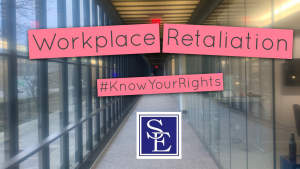The New Jersey Supreme Court issued a decision today invalidating a state employment regulation that required state workplace investigators to request victims and witnesses in harassment investigations to keep all aspects of the investigation confidential. The Court held that the challenged regulation, N.J.A.C. 4A:7-3.1(j), was unconstitutionally overbroad and struck the relevant portion concerning the confidenitialty directive. The decision is a major victory for employees and their rights to speak freely and openly about issues of workplace discrimination and sexual harassment. 
The challenge arose out of an employment lawsuit brought by a Department of Transportation employee who complained of sexual harassment and retaliation. After complaining to the Civil Service Commission about the sexual harassment, the employee, Viktoriya Usachenok, was interviewed by an investigator from the Division of Equal Employment Opportunity/Affirmative Action (“EEO/AA”) who required that Ms. Usachnanok sign a confidentiality agreement prohibiting her from speaking to anyone outside the state about her complaints of sexual harassment.
In her sexual harassment lawsuit, Ms. Usachenok brought a claim for declaratory judgment to invalidate a state regulation that required EEO/AA investigators to impose strict confidentiality upon victims and witnesses of incidents of harassment within state employment. In response to the lawsuit, the Civil Service Commission amended the regulation to require its EEO/AA investigators to request victims and witnesses to keep all aspects of their investigation confidential. The amended regulation was also challenged as a violation of state employees’ rights under the First Amendment and an unlawful restraint of protected rights under the New Jersey Law Against Discrimination.
The case was the first state or federal court decision involving the appropriate role of confidentiality in workplace investigations. While the National Labor Relations Board has issued several decisions concerning confidentiality in workplace investigations under Section 7 of the National Labor Relations Act, this lawsuit is the first of its kind challenging the legality of confidentiality directives under the First Amendment and under state anti-discrimination laws.
In striking down the amended regulation, the Supreme Court held that “the regulation is unconstitutionally overbroad” and would “cause countless victims and witnesses to surrender their protected right to speak freely about harassment and discrimination.” Despite the regulation requiring investigators to merely request confidentiality, the Court found that based on the “inherent power imbalance . . . between the investigator who makes the request and the witness who hears it,” an employee facing such a request “can reasonably be concerned they face consequences if they fail to comply.” The Court found the harms posed by the regulation were “real, not fanciful” and accordingly struck down the confidentiality provision of the regulation.
Christopher J. Eibeler, employment attorney for the law firm Smith Eibeler who brought the challenge commented, “We are proud to represent Viktoryia. Victims of discrimination should never be silenced. For far too long, the New Jersey state government has employed unconstitutional confidentiality directives that have gagged victims and witnesses from speaking freely about incidents of sexual harassment and discrimination in the workplace. We are pleased the Supreme Court saw fit to intervene and put an end to this unlawful practice.”
 New Jersey Employment Lawyers Blog
New Jersey Employment Lawyers Blog

